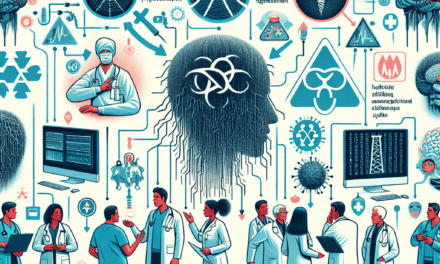Enhancing Clinical Workflows with Pure Storage for Superior Patient Care
In the rapidly evolving landscape of healthcare, the integration of technology into clinical workflows is paramount for improving patient care. One of the most significant advancements in this area is the use of high-performance storage solutions, such as Pure Storage. This article explores how Pure Storage enhances clinical workflows, ultimately leading to superior patient care. We will delve into five key subtopics: the importance of data management in healthcare, the role of Pure Storage in optimizing clinical workflows, case studies showcasing successful implementations, the impact on patient outcomes, and future trends in healthcare storage solutions.
The Importance of Data Management in Healthcare
Data management is a critical component of modern healthcare. With the increasing volume of patient data generated daily, healthcare organizations must adopt effective strategies to manage this information. Poor data management can lead to inefficiencies, increased costs, and compromised patient care.
Healthcare data encompasses a wide range of information, including electronic health records (EHRs), imaging data, lab results, and patient demographics. The ability to access and analyze this data quickly and accurately is essential for healthcare providers to make informed decisions. Here are some key aspects of data management in healthcare:
- Data Volume: The sheer volume of data generated in healthcare settings is staggering. According to a report by the International Data Corporation (IDC), the global healthcare data sphere is expected to reach 2,314 exabytes by 2020, and this number continues to grow.
- Data Variety: Healthcare data comes in various formats, including structured data (like EHRs) and unstructured data (like imaging files). Managing this variety requires sophisticated storage solutions that can handle different data types efficiently.
- Data Security: Protecting patient data is a legal and ethical obligation for healthcare organizations. Compliance with regulations such as HIPAA (Health Insurance Portability and Accountability Act) is crucial, and effective data management plays a significant role in ensuring security.
- Data Accessibility: Healthcare providers need quick access to patient data to make timely decisions. Delays in accessing critical information can lead to adverse patient outcomes.
In summary, effective data management is essential for healthcare organizations to improve operational efficiency, enhance patient care, and ensure compliance with regulations. As the volume and complexity of healthcare data continue to grow, the need for advanced storage solutions becomes increasingly important.
The Role of Pure Storage in Optimizing Clinical Workflows
Pure Storage is a leading provider of data storage solutions that cater specifically to the needs of healthcare organizations. By leveraging flash storage technology, Pure Storage offers high-performance, scalable, and reliable storage solutions that can significantly enhance clinical workflows.
Here are several ways Pure Storage optimizes clinical workflows:
- High Performance: Pure Storage’s all-flash arrays provide exceptional performance, enabling healthcare organizations to access and process data at lightning speed. This is particularly important for applications that require real-time data access, such as EHRs and imaging systems.
- Scalability: As healthcare organizations grow, so do their data storage needs. Pure Storage solutions are designed to scale seamlessly, allowing organizations to expand their storage capacity without disruption to ongoing operations.
- Data Reduction: Pure Storage employs advanced data reduction techniques, such as deduplication and compression, which help organizations save on storage costs while maximizing available space. This is particularly beneficial in environments where data storage costs can be significant.
- Ease of Management: Pure Storage’s user-friendly management interface simplifies storage management tasks, allowing IT staff to focus on more strategic initiatives rather than routine maintenance. This ease of use can lead to improved operational efficiency.
- Integration with Existing Systems: Pure Storage solutions can easily integrate with existing healthcare IT systems, ensuring a smooth transition and minimal disruption to clinical workflows. This compatibility is crucial for organizations looking to enhance their storage capabilities without overhauling their entire IT infrastructure.
By optimizing clinical workflows through high-performance storage solutions, Pure Storage enables healthcare organizations to improve their operational efficiency, reduce costs, and ultimately enhance patient care. The ability to access and analyze data quickly and accurately is essential for making informed clinical decisions, and Pure Storage provides the tools necessary to achieve this goal.
Case Studies Showcasing Successful Implementations
To illustrate the impact of Pure Storage on clinical workflows, let’s explore several case studies of healthcare organizations that have successfully implemented Pure Storage solutions.
Case Study 1: Mount Sinai Health System
Mount Sinai Health System, a leading healthcare provider in New York City, faced challenges with its existing storage infrastructure, which was unable to keep up with the growing demands of its EHR and imaging systems. The organization turned to Pure Storage to enhance its data management capabilities.
After implementing Pure Storage’s all-flash arrays, Mount Sinai experienced significant improvements in performance and efficiency. The organization reported:
- A 50% reduction in storage costs due to advanced data reduction techniques.
- A 10x increase in application performance, allowing clinicians to access patient data more quickly.
- Improved patient care outcomes, as healthcare providers could make faster, data-driven decisions.
This case study highlights how Pure Storage can transform clinical workflows by providing the performance and scalability needed to support modern healthcare applications.
Case Study 2: University of California, San Francisco (UCSF)
UCSF is renowned for its cutting-edge research and patient care. However, the organization faced challenges with its legacy storage systems, which were slow and cumbersome. To address these issues, UCSF implemented Pure Storage solutions across its data centers.
The results were remarkable:
- UCSF achieved a 90% reduction in backup times, allowing for more frequent data backups and improved data protection.
- The organization experienced a 5x increase in data access speeds, enabling clinicians to retrieve patient information in real-time.
- UCSF reported enhanced collaboration among healthcare teams, as data could be shared more easily across departments.
This case study demonstrates how Pure Storage can enhance clinical workflows by improving data access and collaboration, ultimately leading to better patient care.
Case Study 3: Northwell Health
Northwell Health, one of the largest healthcare providers in New York, sought to modernize its IT infrastructure to support its growing patient population. The organization implemented Pure Storage to enhance its data management capabilities.
Key outcomes from this implementation included:
- A 60% reduction in storage footprint, allowing Northwell to save on physical space and energy costs.
- Improved patient satisfaction scores, as clinicians could access patient data more quickly and efficiently.
- Enhanced disaster recovery capabilities, ensuring that critical patient data was protected and recoverable in the event of a system failure.
This case study underscores the importance of modern storage solutions in supporting the operational needs of large healthcare organizations and improving patient care outcomes.
The Impact on Patient Outcomes
The ultimate goal of enhancing clinical workflows with advanced storage solutions like Pure Storage is to improve patient outcomes. The ability to access and analyze data quickly and accurately can have a profound impact on the quality of care provided to patients.
Here are several ways that optimized clinical workflows can lead to better patient outcomes:
- Timely Decision-Making: Quick access to patient data allows healthcare providers to make timely decisions regarding diagnosis and treatment. Delays in accessing critical information can lead to adverse outcomes, particularly in emergency situations.
- Improved Collaboration: Enhanced data sharing capabilities foster collaboration among healthcare teams. When clinicians can easily access and share patient information, they can work together more effectively to develop comprehensive treatment plans.
- Data-Driven Insights: Advanced analytics capabilities enabled by high-performance storage solutions allow healthcare organizations to derive insights from patient data. These insights can inform clinical decision-making and lead to more personalized care.
- Reduced Errors: Streamlined workflows and improved data accessibility can help reduce errors in patient care. For example, having accurate and up-to-date medication information readily available can prevent medication errors.
- Enhanced Patient Engagement: When healthcare providers have access to comprehensive patient data, they can engage patients more effectively in their care. This can lead to improved adherence to treatment plans and better health outcomes.
Research supports the notion that optimized clinical workflows lead to better patient outcomes. A study published in the Journal of the American Medical Association (JAMA) found that hospitals with advanced health IT systems, including optimized data management solutions, had lower mortality rates and improved patient satisfaction scores.
Future Trends in Healthcare Storage Solutions
The healthcare industry is continuously evolving, and so are the technologies that support it. As we look to the future, several trends are emerging in healthcare storage solutions that will further enhance clinical workflows and patient care.
- Artificial Intelligence (AI) Integration: The integration of AI into healthcare storage solutions will enable organizations to analyze vast amounts of data more efficiently. AI algorithms can identify patterns and trends in patient data, leading to more accurate diagnoses and treatment plans.
- Cloud Storage Solutions: The adoption of cloud storage solutions is on the rise in healthcare. Cloud-based storage offers scalability, flexibility, and cost-effectiveness, allowing organizations to manage their data more efficiently while ensuring compliance with regulations.
- Interoperability: As healthcare organizations increasingly adopt electronic health records and other digital solutions, the need for interoperability becomes critical. Future storage solutions will need to facilitate seamless data exchange between different systems to improve care coordination.
- Enhanced Security Measures: With the growing threat of cyberattacks in healthcare, future storage solutions will need to prioritize data security. Advanced encryption methods, multi-factor authentication, and robust access controls will be essential to protect sensitive patient information.
- Focus on Patient-Centric Care: Future storage solutions will increasingly focus on supporting patient-centric care models. This includes providing patients with access to their health data and enabling them to participate actively in their care.
As these trends continue to shape the healthcare landscape, organizations that embrace advanced storage solutions like Pure Storage will be better positioned to enhance clinical workflows and improve patient care.
Conclusion
In conclusion, enhancing clinical workflows with Pure Storage is a transformative approach that can lead to superior patient care. Effective data management is essential in healthcare, and Pure Storage provides the high-performance, scalable, and reliable storage solutions needed to optimize clinical workflows. Through compelling case studies, we have seen how organizations like Mount Sinai Health System, UCSF, and Northwell Health have successfully implemented Pure Storage solutions to improve operational efficiency and patient outcomes.
The impact of optimized clinical workflows on patient care cannot be overstated. Timely decision-making, improved collaboration, data-driven insights, reduced errors, and enhanced patient engagement are all critical factors that contribute to better health outcomes. As we look to the future, emerging trends in healthcare storage solutions, including AI integration, cloud storage, interoperability, enhanced security measures, and a focus on patient-centric care, will further enhance the capabilities of healthcare organizations.
Ultimately, by leveraging advanced storage solutions like Pure Storage, healthcare organizations can not only improve their operational efficiency but also provide the highest quality of care to their patients. The journey toward superior patient care is ongoing, and embracing innovative technologies will be key to achieving this goal.





